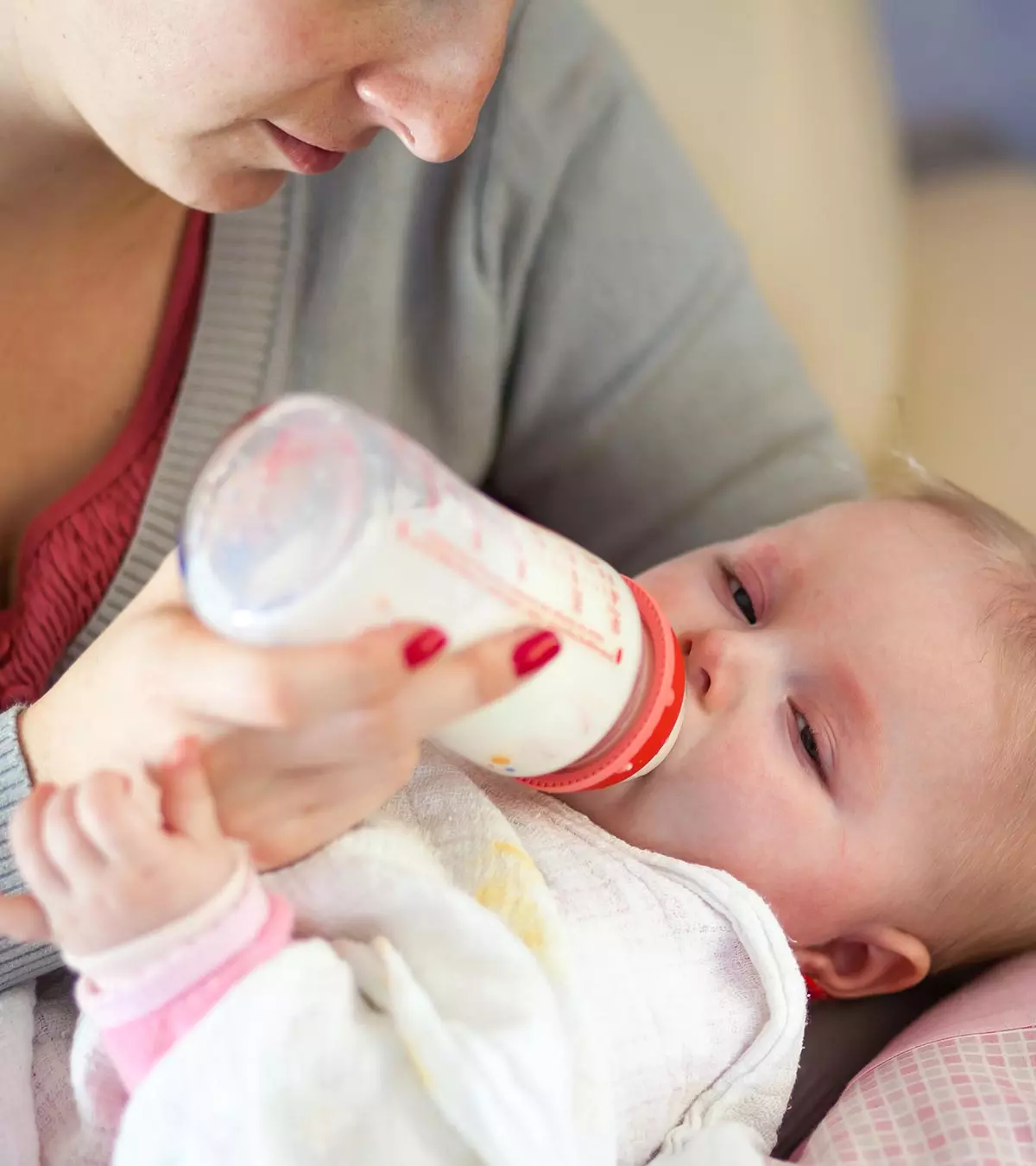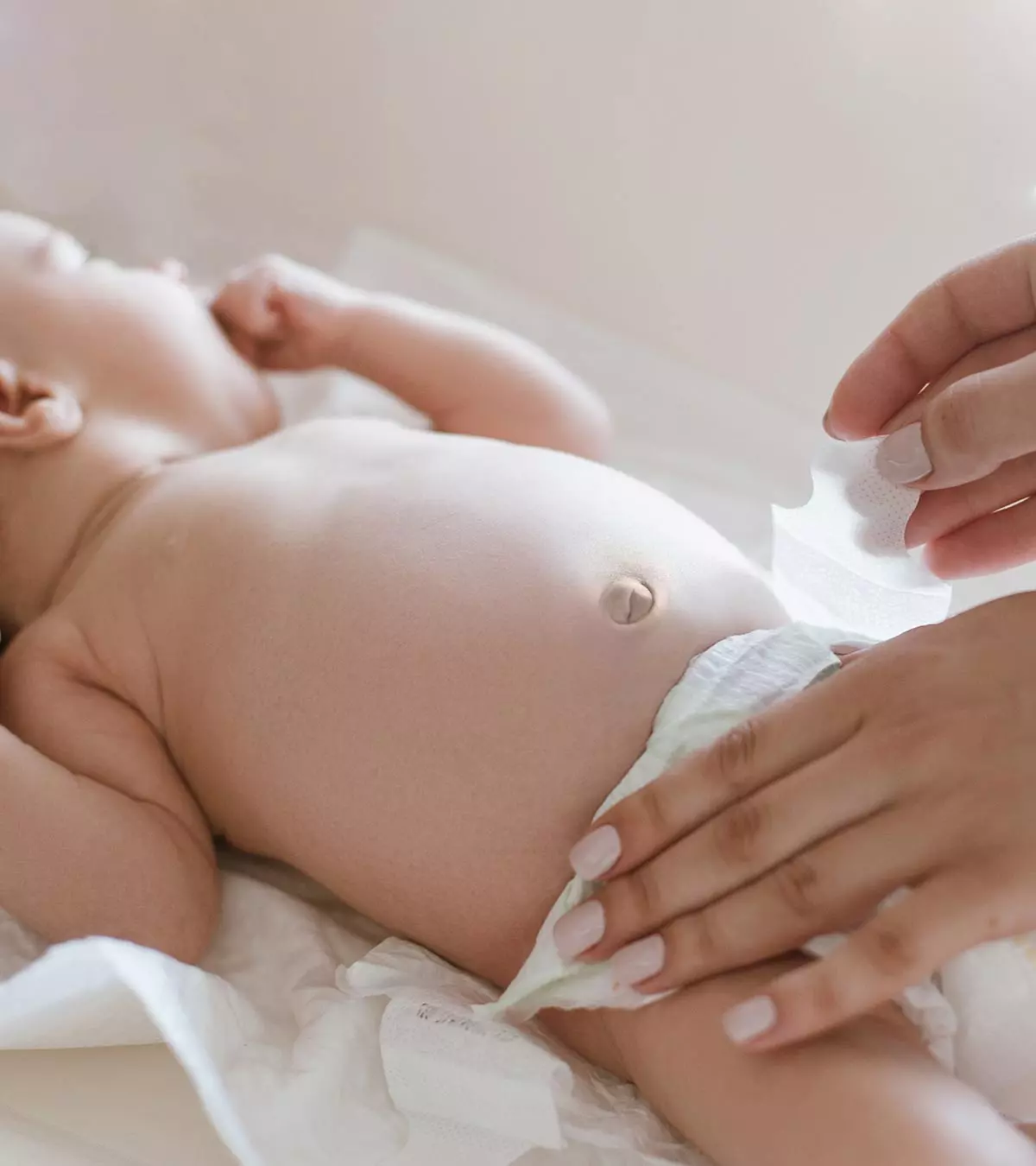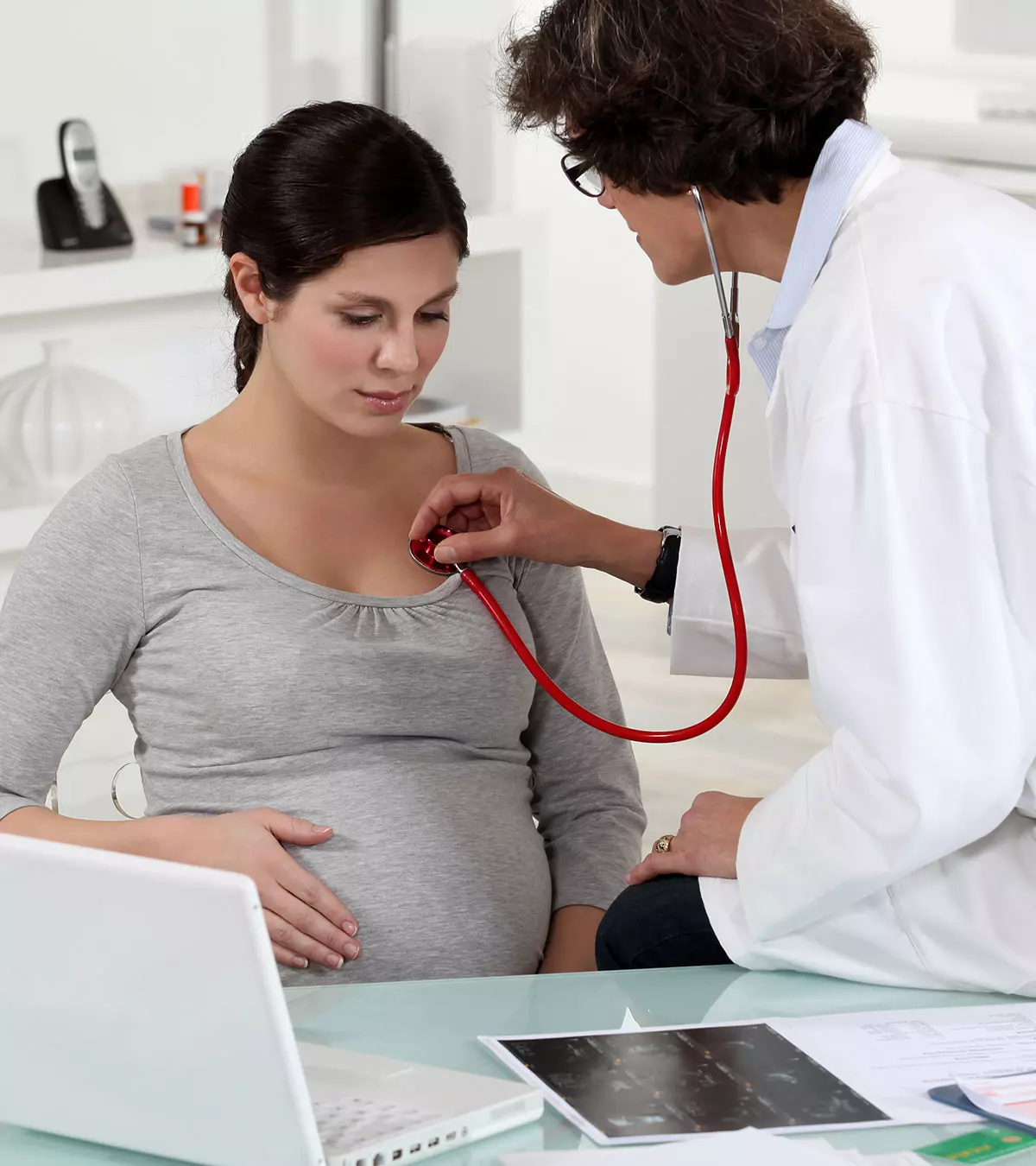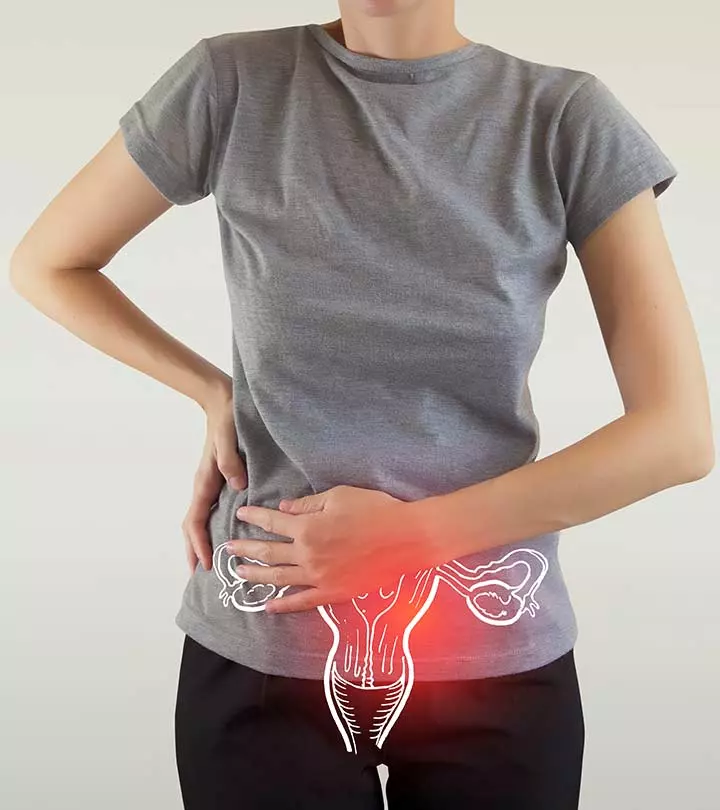
Image: iStock
Uterine pain in early pregnancy is common and indicates your body is preparing for the pregnancy. This pregnancy-related pain may be due to several reasons, such as stretching the uterus or hormonal changes. You are also likely to experience low-back or pelvic pain due to these changes. The pregnancy journey is accompanied by significant physical changes, some of which are natural to maintain a healthy pregnancy. However, it is essential to understand the symptomatic difference between the pains since some may indicate complications such as ectopic pregnancy or miscarriage. Learn about the common causes of uterine pain in early pregnancy, when to worry, and the treatment management.

Key Pointers
- Uterine pain has been considered a normal indication of pregnancy.
- It occurs in early pregnancy due to stretching and growth of the uterus.
- Other causes of uterine pain in early pregnancy include implantation cramping, round ligament pain, and ectopic pregnancy.
- Mild uterine pain during pregnancy can be treated with home remedies such as a gentle massage or heating pad.
- Severe or persistent uterine pain in early pregnancy should be evaluated by a doctor.
When Does Uterus Pain Start In Pregnancy?

You may start experiencing mild or sharp uterine pain during the first trimester or within the first 12 weeks of pregnancy. It is similar to period or “stitch” like pain (1).
What Causes Uterus Pain In Early Pregnancy?
Some possible causes of uterus pain in early pregnancy include:
- Stretching of the uterus: As you reach the 12th week of pregnancy, you may feel uterus pain as it expands out of the pelvic area to the size of a grapefruit. The stretching may be accompanied by pregnancy symptoms like period-like cramps and mild spasms. In twin or multiple pregnancies, the ligament stretching of the uterus may begin earlier, and hence you can feel the pain before 12 weeks (2) (3). Implantation pain could also be the cause of uterine pain in the first trimester.
- Gas or constipation: The increased progesteroneiA female reproductive hormone that plays an important role in menstruation, pregnancy, and breastfeeding level in the body is one of the primary reasons for gas or constipation during pregnancy. The hormone induces increased relaxation of the intestinal muscles resulting in slower digestion. Thus, the bowel movement through the intestinal tract slows down by 30%, allowing gas to accumulate (4). The symptoms are similar to stretching the uterus and generally do not cause severe discomfort.

- Round ligament pain: The connective tissues in the pelvis attached to the uterus are called round ligaments. When the uterus begins to expand, these ligaments tend to resist the pull, causing the pain. You may feel a sharp pain on both or either side of the lower pelvic area (5).
- Pelvic floor pain: A pelvic floor consists of muscles, connective tissues, and ligaments that lie beneath and support the bladder, rectum, uterus, and vagina (6). Pain in the vagina, bladder, abdomen, back, or near the uterus indicates pelvic floor pain. Commonly, it may be masked as uterine pain due to the expansion of the uterus or the relaxin hormone. The hormone produced enables relaxation of the uterine wall while giving birth and can induce pelvic pain in early pregnancy (7).
 Point to consider
Point to consider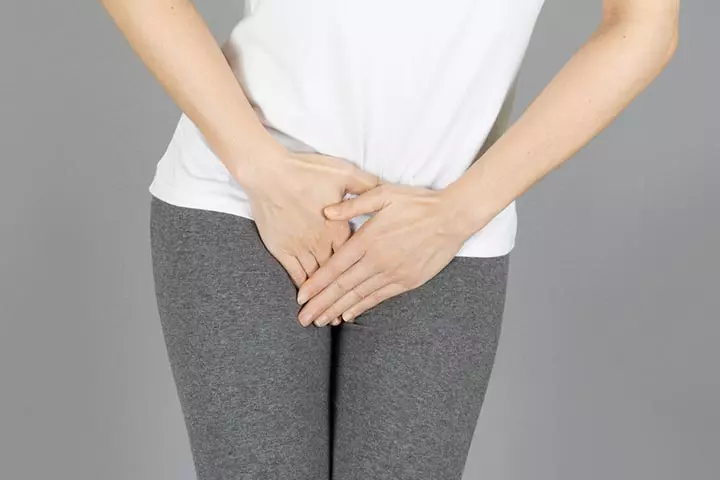
When To Worry?
In most cases, the uterus pain you feel during the first trimester may not be harmful to maternal health. However, some specific concerning symptoms could indicate a complication.
- Miscarriage: In every pregnancy, there is a chance of miscarriage, and if they do occur, it is likely to happen before 20 weeks of pregnancy. Therefore, if the pain does not go away or persists for longer periods and is accompanied by bleeding, sudden cramps, vaginal spotting, or low-back pain, it may be a miscarriage (7) (1).
Dava Krause, a mother of two, shares her miscarriage experience. She writes, “When I was at 11 weeks, I started to feel a dull tightening in my lower abdomen that came in waves. I tried to ignore it… At 12 weeks, my Depression was lifting, and I went to the doctor for my nuchal translucency exam… After the exam, I told the doctor about the pain… She said it was probably round ligament pain but to keep her posted if it worsens.
“A week later… I was in so much pain that I couldn’t sleep. I spent most of the night on the floor stretching, thinking it must be round ligament pain coupled with my tight hips acting up. In the morning, I called my OBGYN. She asked if I was spotting. I said no. She told me to take more Tylenol and to come to see her when I got home… A day after we came home, I went to the bathroom to pee for the 100th time. Before I could make it to the toilet, my pants flooded. At first, I thought I had pissed myself, but then suddenly I knew — my water had broken (i).”

- Ectopic pregnancy: Although abdominal pain during pregnancy is not unusual, the presence of severe pain along with other particular symptoms could be a sign of an ectopic pregnancy. At times, the fertilized egg may get implanted outside the uterus, such as in the fallopian tubeiA hollow tube-like structure that connects ovaries to the uterus and forms a channel for the transportation of the eggs , resulting in an ectopic pregnancy. In such a case, you need to watch out for signs such as severe abdominal pain on either side of the lower abdomen, bleeding, dizziness, or difficulty in passing stool or urine (7) (1).
- Ovarian torsion: The presence of the corpus luteal cystiA functional ovarian cyst that is formed when the corpus luteum fails to relapse and keeps growing after the release of an egg during the first trimester that helps support the pregnancy may sometimes overgrow, causing the ovaries or the fallopian tubes to twist on the surrounding tissues. This is called ovarian torsion, which may occur between the sixth and 14th weeks of pregnancy (8). You may experience severe pain with vomiting, dizziness, and sudden cramps that can continue for days to even weeks. The torsion prevents the blood supply to the ovaries and requires medical assistance (9).
If you experience severe uterine or abdominal pain along with symptoms like bleeding, seek immediate medical attention.
 Did you know?
Did you know?How To Treat Uterine Pain In Early Pregnancy?
The treatment for uterine pain in pregnancy depends on the underlying causation of the problem. If an ovarian torsion or ectopic pregnancy is detected, surgery is the practical option to prevent further complications (7). On the other hand, pregnant women with round ligament pain may be suggested to wear an elastic belly band to support the weight of the belly and avoid certain positions that worsen their pain.
Staying hydrated, taking warm baths, keeping a pillow under the belly when lying down, prenatal massages, yoga, and stretches may also help with round ligaments and growing pains (11).
Women with constipation may be asked to eat a fiber-rich diet, drink plenty of fluids, and drink prune juice. Those with gas and bloating may be advised to spread small meals throughout the day, chew well, and avoid naturally gas-inducing foods (12). However, in severe cases, pregnancy-safe medications may be given to deal with symptoms.
How To Manage Uterine Pain In Early Pregnancy?
If no alarming conditions are detected, you may try the following home remedies of prenatal care to manage the condition after consulting with your OB/GYN (5) (7).
- Drink plenty of water and fiber-rich foods to prevent and manage gas and constipation.

- Relax with a warm bath or use a heating pad, ensuring it is not too hot.
- Switch between sleep positions–lying on your back and sleeping on your side with a pillow to support your belly.
- Incorporate pregnancy-safe exercises that involve light stretching in your routine.
- Massage the pain area gently without putting too much pressure on it.
- Keep your knees close to your chest to take the pressure off your uterus.
Frequently Asked Questions
1. How can I feel my uterus in early pregnancy?
You can feel your uterus by touching your growing belly
2. Can I feel the uterus stretching at four weeks?
In the first few weeks of pregnancy, the uterus does not go through any expansion or other significant changes. It is only around the 12th week that uterine growth and changes occur. You may experience the uterus stretching with mild pain.
3. Can an ectopic pregnancy move to the uterus on its own?
Ectopic pregnancy cannot move or be moved to the uterus from its place of implantation. It always requires medical or surgical treatment for removal, depending on the location and weeks of gestation (10).
Although uterine pain occurring as an early pregnancy symptom is common, it can be an overwhelming experience with recurring pregnancy discomfort and pain, especially for first-time moms. However, it is okay to be concerned but do not hesitate to consult your doctor when in doubt. Sometimes the signs may not be too evident. Therefore stay mindful of the alarming signs and seek medical care for prompt treatment to prevent further complications. Additionally, follow the tips to stay healthy and prevent such issues altogether.
Infographic: Ways To Manage Uterus Pain In Early Pregnancy
Uterus pain is common during pregnancy but should not be ignored if persistent. Some pains may indicate pregnancy complications. The infographic below suggests some home remedies for uterus pain in early pregnancy. Consult your doctor if symptoms do not resolve in a few days.
Some thing wrong with infographic shortcode. please verify shortcode syntaxIllustration: Uterus Pain In Early Pregnancy: Causes And When To Worry
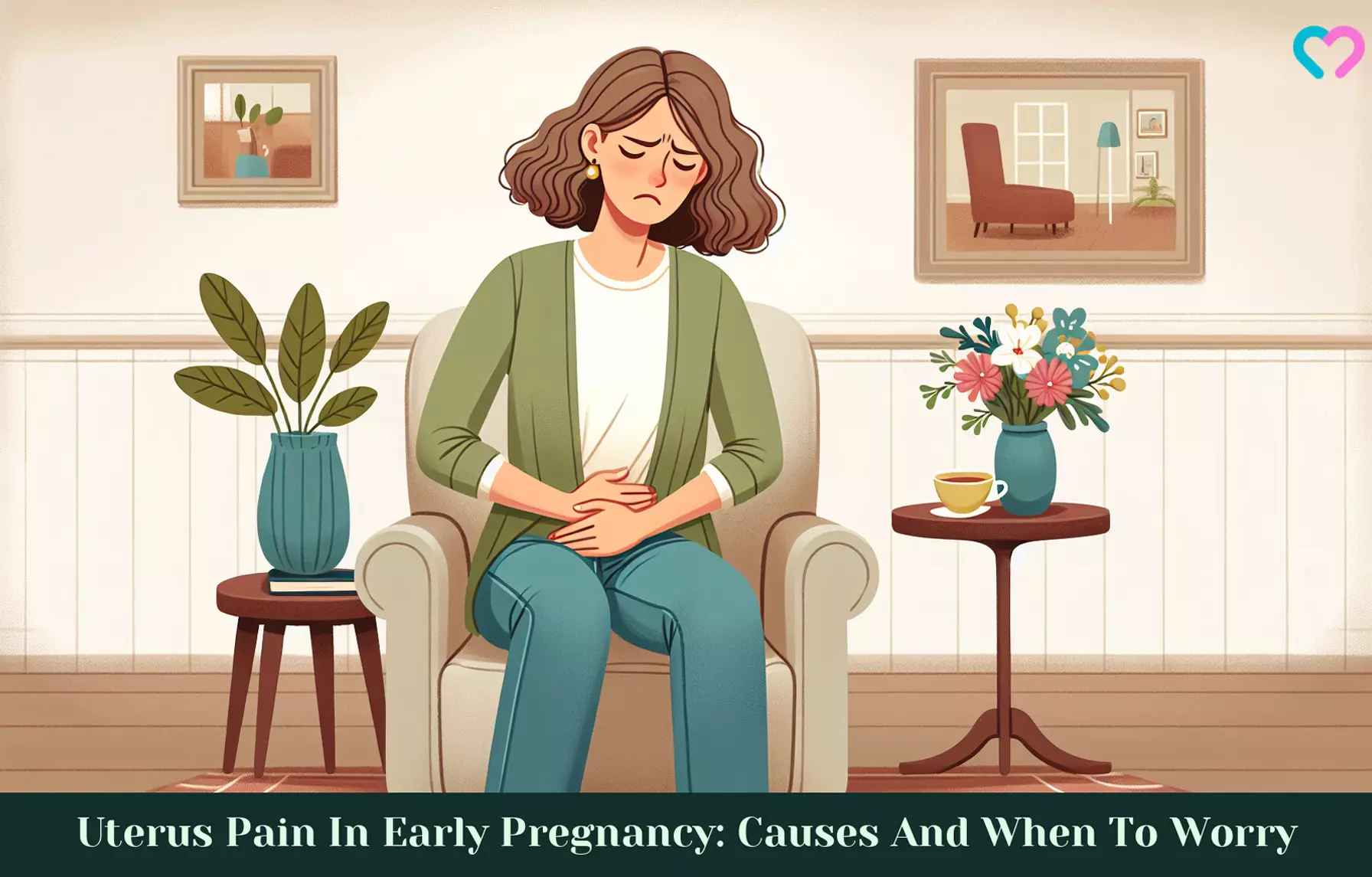
Image: Dall·E/MomJunction Design Team
Pelvic pain in early pregnancy can be overwhelming. Learn about the symptoms, causes, and tips for relief in this informative video.
Personal Experience: Source
MomJunction articles include first-hand experiences to provide you with better insights through real-life narratives. Here are the sources of personal accounts referenced in this article.
i. An emoji for miscarriage.https://medium.com/@davakrause/an-emoji-for-miscarriage-625d4112acb8
References
- Stomach (abdominal) pain or cramps in pregnancy.
https://www.tommys.org/pregnancy-information/pregnancy-symptom-checker/stomach-abdominal-pain-or-cramps-pregnancy - When should cramps during pregnancy be worrisome.
https://wfmchealth.org/maternity-health-care/when-should-cramps-during-pregnancy-be-worrisome/ - Uterus size during pregnancy.
https://americanpregnancy.org/healthy-pregnancy/pregnancy-health-wellness/uterus-size-during-pregnancy/ - Pregnancy gas.
https://americanpregnancy.org/healthy-pregnancy/pregnancy-health-wellness/gas-during-pregnancy/ - Growing pains during pregnancy are normal.
https://intermountainhealthcare.org/blogs/growing-pains-during-pregnancy-are-normal - About pelvic floor disorders.
https://bladder-pelvic-health.wustl.edu/pelvic-floor-disorders/ - Uterus pain: Learn about the causes and treatment in early pregnancy.
https://www.medanta.org/patient-education-blog/what-causes-uterus-pain-in-early-pregnancy - Randall Young and Kelly Cork (2017). Intermittent Ovarian Torsion in Pregnancy.
https://www.ncbi.nlm.nih.gov/pmc/articles/PMC5965408/ - Ovarian torsion.
https://www.yalemedicine.org/conditions/ovarian-torsion - Ectopic Pregnancy.
https://www.acog.org/womens-health/faqs/ectopic-pregnancy - Round Ligament Pain.
https://my.clevelandclinic.org/health/symptoms/21642-round-ligament-pain - Constipation and Gas in Pregnancy.
https://mydoctor.kaiserpermanente.org/ncal/article/constipation-and-gas-in-pregnancy-882380
Community Experiences
Join the conversation and become a part of our nurturing community! Share your stories, experiences, and insights to connect with fellow parents.
Read full bio of Dr. Pamela Adhiambo Muga
Read full bio of Aneesha Amonz
Read full bio of Rebecca Malachi
Read full bio of Reshmi Das












